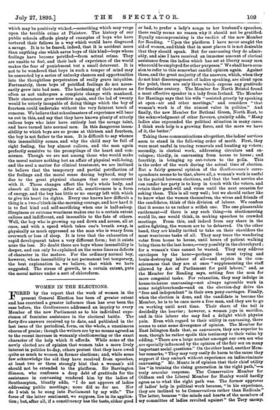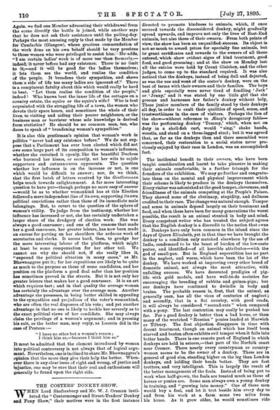WOMEN IN THE ELECTIONS.
FIRED by the report that the work of women in the present General Election has been of greater extent and has exercised a greater influence than has ever been the ease before, the Gentlewoman addressed an inquiry to every Member of the new Parliament as to his individual expe- rience of feminine assistance in the electoral battle. The forty-five answers received up to date, and published in the last issue of the periodical, form, on the whole, a unanimous chorus of praise; though the writers are by no means agreed as to the recent increase in womanly electioneering or the exact character of the help which it affords. While some of the newly elected are of opinion that women take a more lively interest in politics to-day, others protest that they have owed -quite as much to women in former elections; and, while some few acknowledge the aid they have received from speeches, at least two or three strongly hint that a woman's aid should not be extended to the platform. Sir Barrington Simeon, who confesses a deep debt of gratitude for the assistance in canvassing rendered him by the ladies of Southampton, bluntly adds, "I do not approve of ladies addressing public meetings ; none did so for me. Nor do I wish to be sung into Parliament by my wife." The force of the latter sentiment, we suppose, lies in its applica- tion; but, after all, if a constituency has the taste, either good
or bad, to prefer a lady's songs to her husband's speeches, there really seems no reason why it should not be gratified. Equally uncompromising is the verdict of the new Member for Reading. "Upon the platform I have never sought the aid of women, and think that in most places it is not desirable that they should speak. But for canvassing they do admir- ably, and also I have received an immense amount of clerical assistance from the ladies which has set at liberty many men who could be employed for other purposes." We shall have occa- sion to refer to this somewhat candid opinion again. Against these, and the great majority of the answers, which, when they do not hint discouragement of ladies speaking, are silent upon the point, there are only three which express any gratitude for feminine oratory. The Member for North Bristol found a most effective speaker in a lady from Ireland. The Member for Hastings says that his wife "assisted greatly by speaking at open - air and other meetings," and considers " that woman's work is of the utmost value in politics." And finally, the new Member for Bethnal Green, North East, to the acknowledgment of other favours, quaintly adds, "Many ladies also expounded the political situation in many cases. I think such help is a growing force, and the more we have of it, the better."
Taking these communications altogether, the ladies' services seem to stand in the following order of merit. First, they were most useful in tracing removals and hunting up voters ; secondly, in clerical work, addressing circulars and en- velopes; thirdly, in canvassing from house to house ; and fourthly, in bringing up out-voters to the polls. This is the order of the work during the actual time of election. But a fairly general opinion of the Gentlewoman's corre- spondents seems to be that, above all, a woman's work is useful in the period between elections, and that the best service she can render her party is to keep in touch with the voters, and retain their good-will and votes until the next occasion for asking them. This is all very well ; but we should rather like to know what the women themselves, the wives and friends of the candidates, think of this division of labour. We confess that it seems to us rather a selfish one. The one pleasurable excitement—if there is any such thing—in electioneering would lie, one would think, in making speeches to crowded meetings. From this, and indeed from any share in the active fighting, the women are to be debarred. On the other hand, they are kindly invited to take on their shoulders the moat wearisome tasks of all. They may trace the wandering voter from house to house, until hours of patient walking bring them to the last home,—very possibly in the churchyard ; for a woman's time cannot be wasted. They may address envolopes by the hour—perhaps the most trying and brain-destroying labour of all—and rejoice in the con- sciousness that they are at once " supplementing the staff allowed by Act of Parliament for paid labour," and, as the Member for Reading says, setting free the men for more congenial tasks. For relaxation, they may indulge in house-to-house canvassing—not always agreeable work in some neighbourhoods—and on the election-day drive the "free and independent" in their own pony-carriages. Finally, when the election is done, and the candidate is become the Member, he is to be once more a free man, and they are to go on working until next time. Their share of the toil is decidedly the heavier; however, a woman joys in sacrifice, and in this labour she may find a delight which physics pain. Even with regard to their utility in canvassing, there seems to exist some divergence of opinion. The Member for East Islington finds that, as canvassers, they are superior to men, though he rather spoils this testimony to their value by adding, " There are a large number amongst our own sex who are specially influenced by the opinion of the fair sex on many important social questions." On the other hand, another Mem- ber remarks, " They may very easily do harm to the cause they support if they embark without experience on indiscriminate canvassing." Mr. Mintz is of opinion that their chief utility lies " in training the rising generation in the right path,"—a truly oracular response. The Conservative Member for Oldham and the Liberal Member for Hanley would hardly agree as to what the right path was. The former approves of ladies' help in political work because, " in his experience, they are inclined to be Conservatives rather than Radicals." The latter, because "the minds and hearts of the members of my committee of ladies revolted against " the Tory enemy. Again, we find one Member advocating their withdrawal from the scene directly the battle is joined, while another says that he does not ask their assistance until the polling-day. Perhaps the most amusing reply is that made by the Member for Camlachie (Glasgow), whose gracious commendation of the work done on his own behalf should be very precious to those women who were privileged to assist him. He- adds, "I am certain ladies' work is of more use- than formerly,— indeed, it never before had any existence. There is no limit to it,—and it will be good for the ladies themselves; it lets them see the world, and realise the condition of the people. It broadens their sympathies, and shows them a side of life too many ladies are ignorant of." There is a complacent fatuity about this which would really be hard to beat. " Let them realise the condition of the people," indeed Who knows best the inner life of the cottages on a country estate, the squire or the squire's wife ? Who is best acquainted with the struggling life of a town, the women who devote their spare hours, and sometimes the whole of their lives, to visiting and aiding their poorer neighbours, or the business man or barrister whose sole knowledge is derived from statistics P He should be no common man, too, who dares to speak of " broadening woman's sympathies."
It is also this gentleman's opinion that woman's work in politics "never had any existence before." We do not sup- pose that a Parliament has ever been elected which did not owe some large part of its composition to woman's influence, whether she exercised it openly, like the beautiful Duchess who bartered her kisses, or secretly, set her wits to cajole supporters and outmanceuvre opponents. The question whether her influence is on the increase or not, is one which would be difficult to answer ; nor, do we think, that the first batch of letters received by the Gentlewoman helps much towards enlightenment. A far more interesting question to have put—though perhaps no more easy of answer —would be as to whether womankind has at this Election followed a more independent line of its own, supporting its own political convictions rather than those of its immediate male belongings. But, to revert to the question of the sphere of woman's utility. To judge from the testimony, whether her influence has increased or not, she has certainly undertaken a larger share of the drudgery of election work. She was always a good canvasser ; and one of the reasons that made her a good canvasser, her greater leisure, has now been made an excuse for putting on her shoulders the arduous work of secretaries and clerks. It seems hard, then, to grudge her the more interesting labour of the platform, which might at least be some compensation for her other toil. We cannot see why she should not, if she really likes it, "expound the political situation in many cases," as Mr. Bhownaggree put it ; for her expositions are likely to be quite as much to the purpose as those of some candidates, and her position on the platform a good deal safer than her position has sometimes proved in the streets. But it is not only her greater leisure that makes her a good canvasser. It is an art which requires tact ; and in that quality the average woman has certainly the advantage over the average man. Another advantage she possesses, in being better skilled in appealing to the sympathies and prejudices of the voter's womankind, who are often the real disposers of his vote ; and yet another advantage in that no one is likely to heckle her severely as to the exact political views of her candidate. She may always claim the privilege of a woman's argument ; and in pressing his suit, as the better man, may reply, as Lucetta did in the case of Proteus :- " I have no other but a woman's reason ;
I think him so,—because I think him so."
It must be admitted that the element introduced by woman into political controversy is not always that of logical argu- ment. Nevertheless, one is inclined to share Mr. Bhownaggree's opinion that the more they give their help the better. When. ever there is any clear issue of right and wrong, of justice and injustice, one may be sure that their zeal and enthusiasm will generally be found upon the right side.



































 Previous page
Previous page